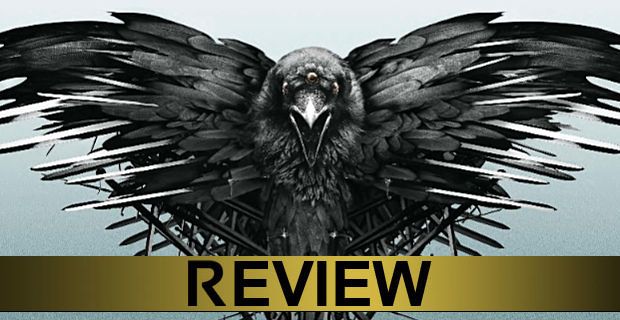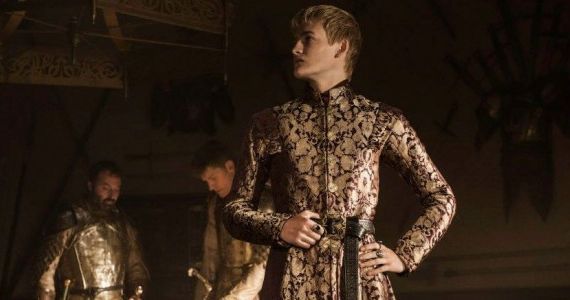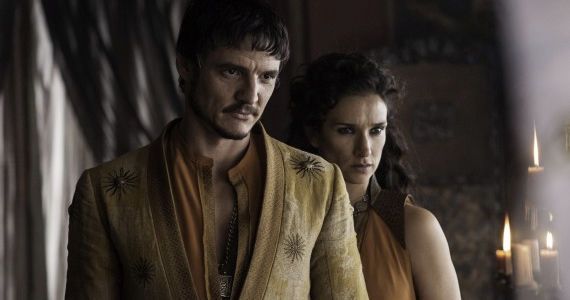[This is a review of Game of Thrones season 4, episode 1. There will be SPOILERS.]
-
HBO's Game of Thrones is at its best when tackling matters of division in the world created by George R.R. Martin. This idea of binary opposition is key to the series' structure, and it has enjoyed varying levels of complexity through the first three seasons. The differences began simply enough in season 1 by highlighting the variation in location between Ned Stark's home in Winterfell and Robert Baratheon's seat on the Iron Throne in King's Landing. While the two men were not in conflict with one another, the settings around them generated a compelling opposition that would later branch out into the far deeper, more personal aspects of series' vast character roster as the audience became more familiar with them.
Early on, these divisions were kept fairly simple; it was north versus south, or - the even less complicated - cold versus warm. This juxtaposition of basic structural components supplied an immediate and clear understanding of Westeros through its differences as they were in relation to one another. Naturally, this binary distinction soon grew more complex and intricate, as the characters and their desires were fleshed out, and, certainly, as the landscape expanded far beyond the two regions that first held any significance (the yearly additions made to the stop-motion map/credit sequence, season after season, offers a great example of the increased enormity of the series' setting). The complexity of these differences reached a new high of sorts in season 3, as the discussion fell most heavily on the division between ideologies and constructs like realms, rulers, and the often-perilous distinction of loyalty.
'Two Swords' kicks-off season 4 with the profoundly symbolic gesture of Eddard Stark's Valyrian steel sword being melted down into two smaller blades; one for Joffrey and one for Jaime. Tywin's act of dividing Stark's sword amongst his family is not merely symbolic in terms of what has happened to the likable members of House Stark; it also alludes once more to the binary principles at play in the structure of the narrative. And yet, in underlining that aspect, many more intriguing and far more personal complexities arise, building the framework for several new and continued character arcs and interpersonal conflicts that David Benioff and D.B. Weiss seem prepared to focus on in the upcoming season.
As it has in seasons past, the premiere sweeps through Westeros with great speed, seamlessly serving up the continuation of the storyline so many have been waiting for. Game of Thrones has become so adept at handling its many storylines within the span of a television hour (which is mercifully much longer on HBO), there's a comforting nonchalance in the way 'Two Swords' briefly checks in with each character, quickly illustrating what's changed – like the size of Daenerys' dragons, as well as her army – and what hasn't – like Tywin's demonstrable ability to enervate anyone (in this instance, it's Jaime) without getting up from behind his desk. Jaime's string of unpleasant meetings with Tywin, Cersei, and Joffrey kicks off a series of murky reunions throughout the episode, like Jon Snow's potentially life-threatening reintegration back into the Night's Watch, Sansa's introduction to her publicly drunken secret admirer, and Arya's violent but admittedly more crowd-pleasing reunion with Needle.
There are plenty of new characters to be introduced as well, such as the tribe of scarred cannibals that've come to aid Ygritte, Thormund, and the rest of Mance's people south of the Wall. Fittingly, however, the hour saves most of its time for the introduction of Oberyn Martell (Pedro Pascal), his lover Ellaria Sand (Indira Varma), and his unquenchable thirst for vengeance against Ser Gregor 'The Mountain' Clegane, as well as Tywin Lannister. After he and Tyrion share a terse conversation, in which the newly appointed Master of Coin tries unsuccessfully to establish common ground by pointing out the fact they're both second sons, Oberyn quickly changes the discussion to the far less pleasant subject of his sister's rape and murder at the hands of Gregor by saying, "Tell your father I'm here. And tell him the Lannisters aren't the only ones who pay their debts."
Peter Dinklage is terrific, as the exchange between Tyrion and Oberyn demonstrates how admitted similarities can sometimes be a greater threat to those in the seat of power than any perceived differences. After all, who is more likely to challenge authority than those who have already tasted it? As Oberyn's intimates: What the Lannisters do, others can do. And naturally, in a place built on the power and authority of the ruling class, this notion is bound to generate considerable heat and discord, as the distinction between those with power becomes more difficult to discern. It calls to mind the failed but continued efforts of Stannis Baratheon, but it also brings the narrative full circle, once again demonstrating that the most influential division in Game of Thrones will always be the one it explores so skillfully: the division between the haves and the have-nots.
Throughout 'Two Swords,' there is a constant demarcation between those in possession of something and those in search of it. Hands (and various other body parts), swords, brains, money, youth, beauty, freedom, integrity…a pony, are all part of the continued focus of how these characters are initially defined by what they are lacking – either temporarily or permanently – while the dramatic manner in which they proceed to overcome that deficiency is the series' greatest strength. This has been the MO of the program from the beginning; the difference here being that season 4 demonstrates the advantages of the program's age. Every character beat feels like it's been crafted to its finest point, while each scene carries with it the possibility of drastic change – but that is only because the series has done such a fantastic job conditioning the audience to expect such things with little warning.
That is one of the pleasures of watching a series like this. And while the deft presentation of an enormous multi-faceted narrative and the successful delivery of tremendous, traumatic events have likely cemented Game of Thrones' place in the annals of TV history already, the series doesn’t shirk its responsibility to make the smaller, character moments – like Arya enacting her revenge with the camera positioned to make the diminutive Stark look as large as the fury within her – say something that deepens the experience in between the moments that seek to define it.
_________________________________________________
Game of Thrones continues next Sunday with 'The Lion and the Rose' @9pm on HBO.



